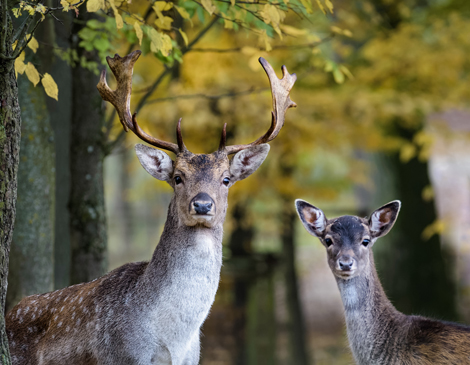Back when I was a suburban child, the only deer I saw were in books, where they frolicked in leafy forests or grazed on castle lawns. When I became a mother and took my children to see Bambi, the hunting scene pierced me to the quick.
Of course, Bambi triumphs in the end. That innocent little orphan grows up to be the Great Prince of the Forest, who fathers his own crop of spindle-legged, adorable fawns. Who start their own families. Who reproduce. And reproduce …
Today, on any given morning, I can look out my window to see three or four deer peacefully grazing on my hostas. They amble down the neighborhood sidewalks, pausing at the corner and looking both ways.
It’s true: Our deer have learned how to cross streets.
Once when I was out for a walk, a buck thundered down the middle of the road with someone’s escaped dog hot on its heels like a scene straight out of Wild Kingdom.
I’ve watched a mother nurse her fawn in my side yard, and there was that memorable evening when a buck and doe did it right out front, trashing my euonymus bush in their passion.
White-tailed deer are our new squirrels.
When, armed with a cookie sheet and large metal spoon, I approach them in my yard, they look up from eating my lilies and blink their shining eyes. Their necks are long and graceful, their heads finely sculpted, their ears like velvet wings.
They watch me come toward them with gracious condescension, as if I’m the interloper, and not an especially attractive one. Even as I wave my spoon, I know who looks ridiculous here, especially if I’m in my pajamas and haven’t brushed my hair, which is highly likely since I’m a writer.
I clang the spoon against the cookie sheet with the fervor of the deranged. The deer watch. I pray my neighbors are not watching, too. After a few moments, with a flick of those gorgeous white tails, they’re up and over the fence.
An hour or so later, they’re back. Nothing seems to keep them away. Not bars of Irish Spring soap, clots of hair from a hairbrush, hot pepper flakes or my ghostly, Miss Havisham scarecrow.
It’s difficult to believe, but once upon a time, hunting and deforestation had completely wiped out Ohio’s deer population. By 1904, the state had not a single deer.
During the ’20s and ’30s, they were reintroduced through a government stocking program. Thank you, said the deer. We will repay your kindness by flourishing in breathtaking abundance.
Deer are what’s called an “edge species.” They thrive where forest and field meet. The trees shelter them, but the fields are where they find their food. Suburbs like mine are one big edge.
My yard is a mini-meadow, my garden a banquet. How can I blame the deer? Really, considering their size, they are dainty and fastidious eaters. Unlike those gluttons the woodchucks, who vacuum up anything in their path, the deer are gourmets, selecting the choicest dahlias, the just-ripe black cherry tomatoes, the tender young tulip buds.
If I were a deer, I’d do the same. Since I am a gardener, I wage war. But what pains me most about the deer isn’t the loss of my flowers and vegetables. It’s the loss of something much harder to replace.
Remember when people put iron deer on their front lawns? They were symbols of wildness, of untamed creatures with secret, even noble lives.
Now instead of hoping to catch a glimpse of one, we pray not to run one over. They’ve lost their mystery, been stripped of their magic. The poor deer have become suburbanites just like the rest of us — and that makes me sad. Our lives are so much about speed, convenience and the known: big-box stores, chain restaurants, the interstates. Surprises, let alone wonder, grow harder to come by.
Yet it’s a mistake to discount Mother Nature. One morning last spring, I stepped outside to find a doe and two very young fawns. Their twiggy legs, their dappled fur. The mother and one baby bounded away but the other stood frozen.
As I took a step closer, it gave a thin, high-pitched bleat, “Maaa.”
I didn’t know a deer could make that sound or any sound at all. It was purely wild, rising from some untouched, primal place.
Frightened deer must have always made that sound, but I’d never heard it. Even as I felt guilty for scaring the fawn, I recognized it as a gift. That cry was heart-rending, and my own heart leapt to meet it.
“It’s all right,” I whispered, backing away. “I won’t hurt you.”
By the time I got inside and looked back out, the fawn had vanished. The wonder of our encounter, though, lingers still.
It was so startling, so moving. In this world there exist, thank goodness, multitudes of things we humans don’t know, things we can’t touch or tarnish. That morning my old sense of wonder flooded back, there in my own backyard.




